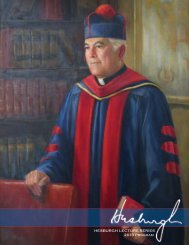HESBURGH LECTURE SERIES 2012 Program - Alumni Association ...
HESBURGH LECTURE SERIES 2012 Program - Alumni Association ...
HESBURGH LECTURE SERIES 2012 Program - Alumni Association ...
You also want an ePaper? Increase the reach of your titles
YUMPU automatically turns print PDFs into web optimized ePapers that Google loves.
Rev. Jerome H. Neyrey, S.J., Ph.D.<br />
Professor Emeritus, Theology<br />
Biography<br />
Rev. Jerome Neyrey, S.J., is a Jesuit priest and a graduate of Yale University. Now a retired<br />
professor from the University of Notre Dame, Neyrey is not your typical Bible teacher. He<br />
specializes in the social and cultural meaning of the Scriptures. Since teachers have little to do,<br />
he writes books (lots) and articles (lots more). Neyrey is the current president of the Catholic<br />
Biblical Society. He recently swapped the classroom for a retreat house in CaJun, La. Neyrey is<br />
known as an excellent teacher and communicator.<br />
Lectures<br />
Jesus Against His Culture: Taking on the Ancient Male Stereotype<br />
Male worth and value came from aggressive behavior: physical, verbal, and sexual aggression, as well as public posturing,<br />
deception, and revenge. In the Sermon on the Mount, Jesus tells his male followers that they must avoid completely all typical<br />
gender games. They must even vacate the playing field, practicing their piety not in public, but in private where no one can give<br />
them credit. How could anyone follow him?<br />
Making Mary: The Cultural Ideal of Ancient Females and the Construction of Mary’s Image<br />
Artists have portrayed Mary according to cultural canons for ideal females, crediting her with whatever was deemed virtuous<br />
for females. Annunciation: she shows appropriate sensitivity to her virginity. Nativity: she delivers Jesus in customary childbirth<br />
fashion. This feast for the eye shows how culture influenced theology. The rich theological ideals are illustrated with appropriate<br />
slides from the early Church. (Ideal for Advent)<br />
“No Male/Female, Slave/Free, Jew/Gentile”- The Impartial, Inclusive God<br />
Although Israelites were thought of as God’s “chosen people,” the God whom Jesus preached had no favorites, accepting all<br />
peoples, genders, and social classes. Jesus’ miracles dramatized this by where he went (Galilee/Gadara) and to whom he brought<br />
God’s blessing (deaf girls/blind men; the centurion’s slave, and Israelites). What Jesus communicated in healings, Paul the<br />
missionary preached to the whole Mediterranean, explicitly telling the gentiles that God is impartial and inclusive. Globalization<br />
for Christians is rooted in Jesus and Paul.<br />
Shame Hurts Worse than Pain: The Noble Death of Jesus<br />
Without analgesics, the ancients suffered considerable pain in teeth, joints, and organs. The Gospels expect that Jesus suffered<br />
a tortuous death, but they focus on the shame he voluntarily endured. They took away his power, slandered him, spat in his face,<br />
and slapped him in the face. He was subjected to a mock coronation and publicly displayed so his enemies could taunt and revile<br />
him. It is not pain (take that, Mel Gibson) that the Gospels focus on, but the shame, which hurts worse than pain. (Ideal for Lent).<br />
80 The Hesburgh Lecture Series, <strong>2012</strong> <strong>Program</strong><br />
Categories<br />
Art/Architecture, Church,<br />
Spirituality



